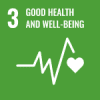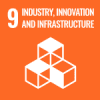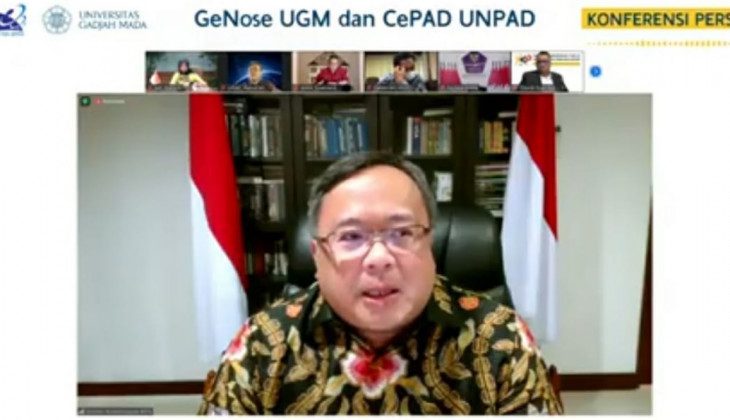Five thousand units of GeNose C19 or Covid-19 detection devices through exhalations made by the UGM research team are ready to be distributed in mid-February 2020. Previously, this tool had received marketing authorization from the Ministry of Health (Kemenkes) last Thursday (24/12).
“The production capacity as of February 2021 will be more than 5,000 units. They can be used and distributed throughout Indonesia,” said the Minister of Research and Technology/Head of the Research and Innovation Agency (Menristek/BRIN), Bambang Brodjonegoro, in an online press conference on Monday (28/12).
Bambang said the flexibility of using the GeNose C19 allows its placement in airports, stations, terminals, hospitals, offices, and other public places such as tourist attractions and shopping centers, so that people are expected to be able to carry out activities safely and comfortably in the context of economic recovery.
Bambang appreciated the presence of this tool. Because the GeNose C19 can strengthen the 4T surveillance system, namely testing, tracing, tracking, and treatment. In addition, the 3M movement still needs to be carried out, namely wearing masks, washing hands, and maintaining distance to minimize the spread of the new coronavirus.
“Indonesia needs to have independence in conducting testing and monitoring, especially for screening. For testing, we do nothing but PCR which is the gold standard. However, for screening, we are required to be able to innovate to produce a tool that can perform screening in a fast, relatively convenient, and high-accuracy,” he explained.
He hopes that this innovation can encourage economic recovery. Thus, the resulting innovations will support the health sector and support efforts to restore economic activity.
Bambang conveyed this GeNose innovation as contributing to increased economic growth through downstream innovation of medical devices. In addition, it saves the budget for the rapid Covid-19 test and encourages the development of innovations with high economic value. Next, accelerate the process of detecting people infected with Covid-19, help mitigate the risk of Covid-19 transmission in various regions and build public confidence that the domestic industry can produce innovative works of the nation’s children.
“Thanks to the UGM research team led by Prof. Kuwat Triyana in helping the handling of Covid-19, especially 4T. We hope that downstream can run smoothly, and we need the support of the Ministry of Health so that innovation of the nation’s children continues to be facilitated, and the support of the Covid-19 Task Force; thus, the tools can be used in the 4T process,” he hoped.
The tool developed by the UGM research team since March 2020 has been proven to have a sensitivity up to 90 percent and a specificity of 96 percent. One unit of Genose C19 is sold for IDR 62 million. It can be used to detect Covid-19 through exhaling very quickly for about 2 minutes without the need for reagents or other chemicals.
Meanwhile, dr. Dian Kesumapramudya Nurputra, GeNose UGM research and development team member, said that 100 units of the Genose C19 had been produced, all of them had been sold. Furthermore, it will produce 100 more units at a later stage with the help of the Ministry of Research and Technology/BRIN. With 100 units and the proper distribution, the tool can test a minimum of 12 thousand people per day at a relatively affordable cost.
“God willing, with the help of several institutions and philanthropy, we will produce around 2,000 at the end of January and 5,000 in mid-February, and the target is to reach 10,000 at the end of February. We hope that 10,000 units will be able to test around 1.2 million people a day. The number of Covid19 testing is vast. It is hoped that soon positive people can be isolated and treated until they recover. At the same time, those who are negative for Covid-19 can move normally but stay alert,” he explained.
Thus, with increased production, it is hoped that GeNose can be distributed more widely. Therefore, it can help deal with Covid-19, especially in the fast detection of the coronavirus when tracing and tracking.
On that occasion, Dian also conveyed how to use and maintain the GeNose C-19. He said that GeNose is easy to use and does not require complicated maintenance efforts. Checks and maintenance are carried out after examining 100 thousand breath samples or if disturbances occur. The machine is simply cleaned by applying a liquid disinfectant, and it is not recommended to use a spray disinfectant. Make sure the device is in the off position before and during cleaning.
“For the reading at the time of detection, if it is positive, it is recommended to take the second exhale within 30 minutes after the first intake. If the results are consistently positive, it is recommended to continue the examination with confirmatory PCR,” he explained.
The GeNose C19 developed by UGM is supported by the Ministry of Research and Technology’s COVID-19 Innovation Research Consortium, the State Intelligence Agency, the Indonesian Army, the Indonesian National Police, the Indonesian Ministry of Health, the Education Fund Management Institute (LPDP), and private parties including PT Yogya Presisi Tehnikatama Industri (mechanical department), PT Hikari Solusindo Sukses (electronics and sensors), PT Stechoq Robotika Indonesia (pneumatics), PT Nanosense Instrument Indonesia (artificial intelligence, electronics and after-sales), and PT Swayasa Prakarsa (assembly, licensing, standards, QC/QA, business ). This Consortium synergy is facilitated and coordinated by the UGM Science Techno Park (UGM STP) which the university has mandated as a facilitation for downstreaming innovation to address the urgent needs of society.



